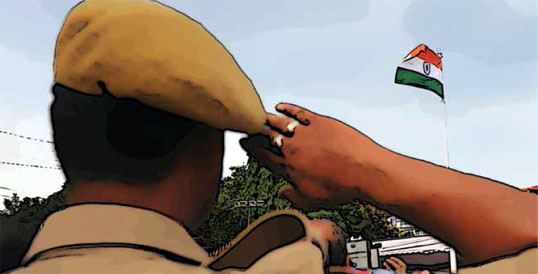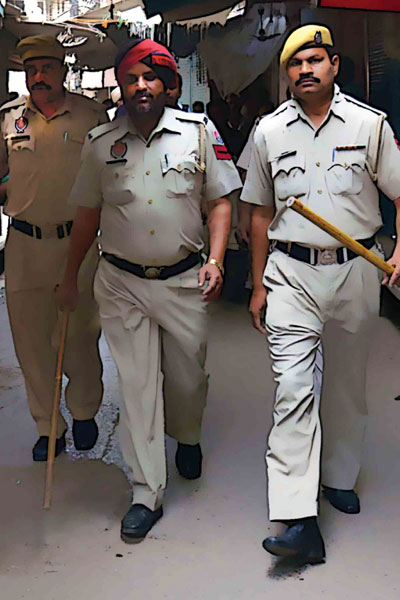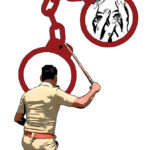- Cover Story
- Governance
- Globe Scan
- Corruption
- State Scan
- Talk Time
- Cover Story
- Governance
- Globe Scan
- Corruption
- State Scan
- Talk Time
Recent Posts
© Copyright 2007 - 2023 Gfiles India. All rights reserved powered by Creative Web INC.Cover StoryCrime and Politics
Twelve years ago, based on a writ filed by the author and his colleague, the Supreme Court insisted on seven-point reforms to get rid of the seven deadly sins that plagued the country’s police forces. The debate rages on as the political class continues to retain its stranglehold over these agencies. It’s time for a radical change – for politicians to understand the urgency, and for the judiciary to insist on their implementation.
NK SinghSeptember 12, 20186 Mins read413 Views
 Written by NK Singh
Written by NK SinghTHE July 3, 2018, Supreme Court’s directive on the appointment of the DGPs has revived the debate on Police reforms. Rejecting a petition for modifications of its September 2006 judgment in Prakash Singh & Others case, the court reiterated that the states must consult UPSC for selecting their police chiefs.
A DGP appointed thus was required to have a minimum tenure of two years. The Centre, represented by Attorney General, had submitted that of the 29 states in the Union, only five had followed the court’s direction. The directive has already had desired effect. The Punjab government has already amended its rules to appoint its DGP out of a panel of three names, recommended by the UPSC on merit-cum-seniority. Appointment of DGPs formed a part of the 7-point police reforms mentioned by the apex court in its September 2006 judgment. The other six directives are as follows:
- State Security Commission
The state governments were directed to constitute such a commission in each state “to ensure that the state government does not exercise unwarranted influence or pressure on the state police and for laying down the broad policy guidelines so that state police always acted according to the laws of the land and the Constitution of the country.” This ‘watchdog body’ was to be headed by the Chief Minister or the Home Minister and the DGP of the state was to be its ex-officio Secretary.
- Minimum tenure of IGP and other Officers
Police Officers on operational duties in the field, like IG, Zone, DIG, range, District SP. and SHO, were also required to have minimum prescribed tenure of two years. This would be subject to promotion and retirement of the officer.
- Separation of Investigating Police
The Investigating Police was to be separated from Law and Order police, subject to full coordination between the two wings, and, to start with, to be introduced in urbantown areas with a population of ten lakh and more each.
- Police Establishment Board
There was to be a Police Establishment Board in each state to decide all transfers, postings, promotions and other service related matters of the officers of the rank of Deputy SP and below. The board was to comprise DGP, and four other senior officers of the department, authorised to make recommendations to the state government regarding transfer and posting of officers of and above the rank of SP. The government was expected to give due weight to these recommendation and normally accept it.
- Police Complaint Authority
There was to be a Police Complaint Authority at the state level and complaint authorities at the districts, to be headed by a retired High Court or Supreme Court judge at the state level and District Sessions judge at the district level, with three to five members, from amongst retired civil servants or police officers. The district level authority was to look into complaints of police excesses, custodial deaths, and other such complaints, in respect of police officers, of and below the rank of DSP. Similar was to be the duty of the state level authority in respect of complaints against officers of the rank of SP and above.
- National Security Commission
The Central Government was to set up a National Security Commission to prepare a panel for being placed before the appropriate Appointing Authority for selection and placement of chiefs of the Central Police Organisations, who should also be given a minimum tenure of two years.
On 3 January, 2007, some states and the Centre filed affidavits on the compliance of the Supreme Court orders. While a few small states reported compliance, though may be watered down, the major ones generally, quivered. The bottom line is that the political class and sections of bureaucracy are opposed to most of the police reforms because they have vested interest in the colonial system, inherited from the British, which give them enormous powers to use or misuse the police for their own political or even personal agenda. Hence, they have resisted moves which may lead to their losing their stranglehold over the police.
The police today is far better equipped with communication networks and transport systems that are more sophisticated Yet, the people are not happy with the police, and the latter has failed to gain the confidence of large sections of the people
No wonder, when Independence came and they promulgated a Constitution establishing a parliamentary democracy, with rule of law, they continued the colonial police system geared to serve the political authority, rather than be accountable to law and the Constitution. They opted for the British parliamentary form of government, but were, and still are, reluctant to adopt their police system. .They are happy to continue with Police Act of 1861, passed by British Parliament in the wake of the 1857 movement, which was designed to sub-serve the agenda of the government. The act, still substantially in vogue in most places, gives the government the power of ‘superintendence’ over the police, which the colonial rulers used to shift police loyalty from the rule of law to the rulers. The democratic governments of free India have not lagged behind, and criminalisation of politics, which the Vohra Committee highlighted, has made things worse.
A time came when, during Emergency, they fell victims to such a police system. It is then that they woke to the need of Police Reforms. The emergence of post-Emergency political leaders, notably Chaudhry Charan Singh, who had a vision for a healthy police system suited to a democratic set up, helped matters. The Janata Party government, led by Morarji Desai in 1977, constituted a National Police Commission, with the former Cabinet Secretary and West Bengal Governor, Dharma Vira as its head. It included NK Reddy, a retired judge of the Madras High Court, MS Gore, professor, Tata Institute of Social Sciences, and eminent police officers such as KF Rustamji, NS Saxena, and former Director of CBI, CV Narsimhan.

IT was asked, inter alia, “to redefine the role, duties, powers and responsibilities of police with special reference to prevention and control of crime and maintenance of public order, and suggest appropriate changes in the system and basic laws governing the system”. The Commission produced eight reports between 1979 and 1981, and made recommendations for through reforms that were aimed at making a police suitable for a democratic system by insulating it from political interference.
The Janata Party, however, had a short life and was replaced by the Indira Gandhi government in early 1980. The report of the Commission carried the stigma of the previous regime, was shelved, and gathered dust.
In 1997 came the Judgment of Supreme Court in the Vineet Narain case. The court went into the problem of political interference in the workings of the investigating agencies, like CBI and Department of Revenue Intelligence at the Centre, and made the observation that there was an urgent need for the state governments to set up a credible mechanism for the selection of the police chiefs. It added that the situation described in the National Police Commission’s Report (1979) about state of police was alarming and must be cured, if the rule of law was to prevail in the country.
Encouraged by the above developments, Prakash Singh, former Director General, Border Security Force, and I filed a writ Petition in April 1996 in the Supreme Court under Article 32 of the Constitution. The order came after over 10 years in September 2006, and gave directions to the Centre and states to implement the above-mentioned seven core reforms. The apex court made it clear that it was issuing the directives under powers vested in it under Article 34, read with Article 114 of the Constitution.
As the struggle for police reforms continues, there is no denying that things have changed. Compared with the earlier times, the responses of the police are far better. The level of police training has improved. In crime detection and investigation work, its methods and approach are more scientific and modern, and we can claim to have caught-up with the advanced countries. The police today is far better equipped with communication networks and transport systems that are more sophisticated Yet, the people are not happy with the police, and the latter has failed to gain the confidence of large sections. They, including eminent citizens of the country, contend that they do not trust the police. This is largely in respect of state police forces, and most of the recommendations of National Police Commission were meant for them.

The ‘Police’ and ‘Public Order’ are subjects in State List, thus giving jurisdiction to the state legislatures over the police. In fact, comparatively, people are much better disposed toward, the BSF and CRPF, whose personnel are often martyred on the borders or on national security duties. In crime investigation works, even today, there are demands for CBI investigations in cases such as the Unao rape and murder, Muzzaferpur shelter home scams, and killings of human rightists, like Gouri Lankesh.
IT appears that a three-front attack is required to give the push to the implementation of police reforms. In the first place, the political class needs to be educated and enlightened regarding the demarcation between its jurisdiction over police work, without curbing its powers. In this area, organisations like the Commonwealth Initiative for Human Rights can play a big role. Secondly, some of the genuine apprehensions of political authority need to be taken care of. They don’t want to be hamstrung by rules coming in the way of discharging their responsibilities. Finally, efforts need to be made at the highest court for their own directives implemented.
NK Singh, IPS, is former Joint Director, CBI, who retired as DGBP (R&D); he is currently Member, National Executive, Janata Dal (United).
Recent Posts
Related Articles
Cover StoryTablighi Jamaat : 1000 years of revenge
Written by Vivek Mukherji and Sadia Rehman Two contradictions are evident. Through April...
ByVivek Mukherji and Sadia RehmanMay 5, 2020Cover StoryWINDS OF CHANGE
Written by Gopinath Menon ADVERTISING : The name itself conjures up exciting images....
ByGopinath MenonMarch 4, 2020Cover StoryTHE ECONOMIC ROULETTE WHEEL
Written by Alam Srinivas THE wheel spins, swings, and sweeps in a frenzied...
ByAlam SrinivasMarch 4, 2020Cover StorySYSTEMS FAILURE, SITUATION CRITICAL
Written by Vivek Mukherji ONE of most quoted allegories of incompetence for a...
ByVivek MukherjiMarch 4, 2020 - Governance
- Governance



























































